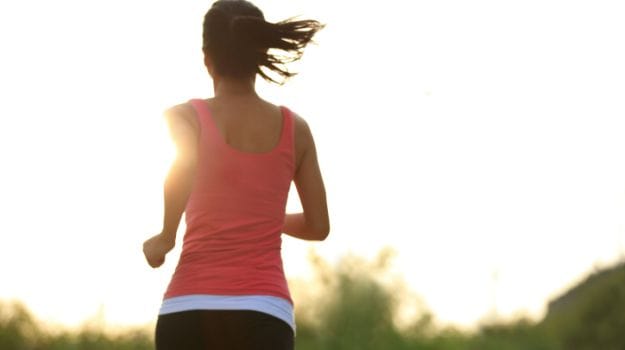Wondering how to sleep well? You're in luck.A lot has been studied and spoken about the benefits of walking daily. Walking is one of the simplest forms of exercise and also the most effective. We know that it can tone up muscles and help with weight loss. At the same time, regular walking strengthens your heart and lungs. Thus, it promotes overall fitness. If you have trouble sleeping, you're in luck.A new study conducted by researchers at the University of Pennsylvania suggests that taking morning walks everyday can help resolve sleep troubles. Yes, we know that you may find it hard to get out of bed but if you keep laziness aside and take a stroll every morning your body will thank you.
(Be on Your Feet to Burn More Calories, Suggest Experts)Physical activity is already well associated with sound sleep, but this new study yields insight into whether specific types of physical activities may impact sleep quality. Activities such as morning walks, biking, gardening and running are associated with better sleep habits, compared to no activity. In contrast, other types of physical activity - such as household and childcare-work are associated with increased cases of poor sleep habits.(Rest Assured: What to Eat to Sleep Better?)"Not only does this study show that those who get exercise simply by walking are more likely to have better sleep habits, but these effects are even stronger for more purposeful activities, such as running and yoga, and even gardening and golf. It was also interesting that people who receive most of their activity from housework and childcare were more likely to experience insufficient sleep - we know that home and work demands are some of the main reasons people lose sleep,” said lead researcher Michael Grandner from Perelman School of Medicine at the University of Pennsylvania in the US.Experts used data on sleep and physical activities of 429,110 adults from the 2013 Behavioural Risk Factor Surveillance System to measure whether each of 10 types of activities was associated with typical amount of sleep, relative to both no activity and to walking.(Worst Foods That Are Ruining Your Sleep)Survey respondents were asked what type of physical activity they spent the most time doing in the past month, and also asked how much sleep they got in a typical 24-hour period.This information was then compared to those who reported that they did not get physical activity in the past month, all types of activity except for household/childcare were associated with a lower likelihood of insufficient sleep.(Put Your Best Foot Forward: Why Walking is Good For You)To assess whether these effects are just a result of any activity, they were compared to those who reported walking as their main source of activity. Compared to just walking, aerobics/calisthenics, biking, gardening, golf, running, weight-lifting and yoga/pilates were each associated with fewer cases of insufficient sleep, and household/childcare activity was associated with higher cases of insufficient sleep. These results were adjusted for age, sex, education level, and body mass index."Although previous research has shown that lack of exercise is associated with poor sleep, the results of this study were surprising," concludes Grandner.With inputs from PTI
(Be on Your Feet to Burn More Calories, Suggest Experts)Physical activity is already well associated with sound sleep, but this new study yields insight into whether specific types of physical activities may impact sleep quality. Activities such as morning walks, biking, gardening and running are associated with better sleep habits, compared to no activity. In contrast, other types of physical activity - such as household and childcare-work are associated with increased cases of poor sleep habits.(Rest Assured: What to Eat to Sleep Better?)"Not only does this study show that those who get exercise simply by walking are more likely to have better sleep habits, but these effects are even stronger for more purposeful activities, such as running and yoga, and even gardening and golf. It was also interesting that people who receive most of their activity from housework and childcare were more likely to experience insufficient sleep - we know that home and work demands are some of the main reasons people lose sleep,” said lead researcher Michael Grandner from Perelman School of Medicine at the University of Pennsylvania in the US.Experts used data on sleep and physical activities of 429,110 adults from the 2013 Behavioural Risk Factor Surveillance System to measure whether each of 10 types of activities was associated with typical amount of sleep, relative to both no activity and to walking.(Worst Foods That Are Ruining Your Sleep)Survey respondents were asked what type of physical activity they spent the most time doing in the past month, and also asked how much sleep they got in a typical 24-hour period.This information was then compared to those who reported that they did not get physical activity in the past month, all types of activity except for household/childcare were associated with a lower likelihood of insufficient sleep.(Put Your Best Foot Forward: Why Walking is Good For You)To assess whether these effects are just a result of any activity, they were compared to those who reported walking as their main source of activity. Compared to just walking, aerobics/calisthenics, biking, gardening, golf, running, weight-lifting and yoga/pilates were each associated with fewer cases of insufficient sleep, and household/childcare activity was associated with higher cases of insufficient sleep. These results were adjusted for age, sex, education level, and body mass index."Although previous research has shown that lack of exercise is associated with poor sleep, the results of this study were surprising," concludes Grandner.With inputs from PTI
Advertisement








